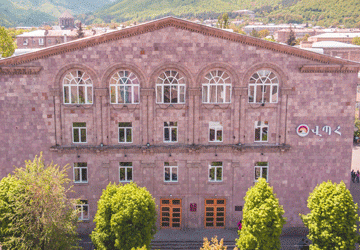
In-House Online Trainings at Vanadzor State University
09 Apr 2021
Online TTs took place from the 5th to the 30th of April at Vanadzor State University
From April 5 to April 30 2021, a number of trainings “ISSUES AND PERSPECTIVES OF DIGITALLY-ENHANCED INNOVATIVE TEACHING & LEARNING IN HIGHER EDUCATION” took place at Vanadzor State University within the framework of the "Change in Classroom: Promoting Innovative Teaching & Learning to Enhance Student Learning Experience in Eastern Partnership Countries" project. 107 lecturers from Vanadzor State University participated in the trainings.
The training was conducted by Anna Arakelyan, Arine Danielyan, Hermine Baburyan, Maria Brutyan, Anna Khachatryan, Vanane Mirzoyan and Kristine Ghazaryan. The trainers had previously been trained in European Universities in 2018: Fh Joanneum Gesellschaft M.B.H., Katholieke Iniversiteit Leuven, Linkopings Universitet, Universidade Do Porto, Universitat De Barcelona.
In 2021 they participated in “ISSUES AND PERSPECTIVES OF DIGITALLY-ENHANCED INNOVATIVE TEACHING & LEARNING IN HIGHER EDUCATION” forum, which took the form of an online webinar. The forum was organized for trainees from Armenia, Georgia and Belorussia.
The forum focused on how European and Eastern Partnership Country (EPC) universities responded to the changes in teaching and learning (T&L) that came up because of Covid-19 crisis.
During that forum such topics as “Interactive teaching in an online Environment”, “Designing Online Learning Based on the Community of Inquiry Framework”, “Designing Online Examinations”, “Assessment of and for Online Learning”, “How the Numbers of the Online Quizzes Have Changed since the Pandemic Situation” were discussed.
These interactive online workshops are designed to support teachers in enhancing their teaching qualifications with competencies in the field of online teaching practice to meet the current needs of the students. Due to Corona Crisis, there is a need to go beyond blended learning to “shatter the timetable” as the way to keep the cohort community, avoid zoom fatigue, and still build skills among students. The use of online learning, thrust into widespread use by the current pandemic, has been embraced not only by students but also by lecturers as a part of a blended learning model. However, good online teaching requires teachers to have very different skills. It’s not about teaching people about a subject, but about providing guidance, mentoring, coaching to help students understand the relevance of what they learn about. Creating meaningful interactions online is more time-consuming than lecturing face-to-face, but providing access to stimulation asynchronous learning will be a very valuable adjunct to face-to-face tutorials and much more valuable than being one of many in a massive lecture theatre. Thus, there will be plenty of time to share the experience of online or campus teaching, especially considering the current pandemic and the rapid digitalization of teaching that has occurred.
In the framework of trainings which were held for about a months, different issues connected with designing an online activity were conducted, integrating learning principles and strategies in online activity design, teaching Practices for Remote Project Based Learning, the Roles of a Teacher in Project Based Learning, Technology and Tools for Remote PBL, efficiency in learning, main learning principles and strategies from the learner’s perspective, What Do Students Need to Keep their Motivation in Learning?, What is the Most Important for Lecturers When Designing an Online Course? And many other current topics.
From April 5 to April 7, 2021, Anna Arakelyan conducted training in Vanadzor State University. The title of training course was ''Designing Meaningful Online Learning''. The essence of the model, constructional elements, principles of organizing productive online learning were presented to the participants.
On April 8, 9, 12, Arine Danielyan conducted training. The participants got acquainted with the essence of the "Online Teaching Revisited" template, structural elements, principles of organization and implementation, procedure. During the course participants obtained some theoretical knowledge and some good practice with examples related to online teaching, such as how to facilitate an online course, quantity or quality in teaching, students' attention, active participation, feedback on their experience and their competencies gained during the course, create a community of practice to share and develop their competences.
On April 13, 14, and 15, Vanane Mirzoyan conducted "Online Learning Activity Design - Supporting Students Learning Online'' training. Within the course of the three-day active workshop, the privileges and drawbacks of the hybrid online teaching and learning, the structure of the courses, and the effectiveness of the implementation of project-based learning were discussed.
On April 16, 19 and 20, Anna Khachatryan, and on April 21-23, Hetmine Baburyan conducted an online training course “Video as a Learning Tool for Remote Emergency Teachers''. In order to acquire practical skills programs were selected and mastered during the training, the main tools of which can be used both in organizing the lesson effectively in emergencies and achieving different teaching goals in normal conditions.
On April 26, 27 and 28, Maria Brutyan conducted an online course “Online Active Teaching & Learning: Experiences with Technology''. During the training, they not only conducted group discussions via ZOOM platform and provided feedback through Mentimeter, but also learned to create their own Padlet platform, prepare video with questions through Edpuzzle, get acquainted with online Escape room through Genially.
From April 28 to April 30, Kristine Ghazaryan conducted an online course “Digitally Supported Learning and Digital Competence Framework for Teachers''. During the discussions the participants pointed out the positive and negative sides of online education conditioned by Covid-19, represented a great variety of tools used during the process.
The three-day training was purposeful and productive. The training was held in the agreeable atmosphere of cooperation. The participants underlined the importance of involving the students in online educational process and making them active participants of the educational process. Everybody suggested ideas, the results of brainstorming were depicted on the represented platform.
![]() Syllabi of the Trainings
Syllabi of the Trainings
![]() Participants Lists
Participants Lists
![]() Feedback Evaluation
Feedback Evaluation



